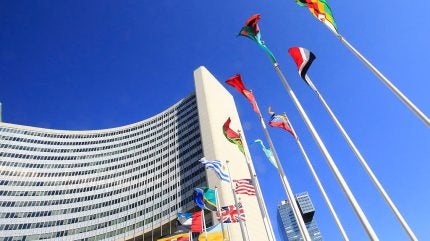
In 1968, small-time Austrian architect Johann Staber became the unexpected winner of a competition to build the UN’s third official headquarters, in Vienna.
Up until this point a designer of unremarkable elementary schools and municipal flats, Staber is reputed to have run a rather ‘relaxed office’ in the years before the competition.

Access deeper industry intelligence
Experience unmatched clarity with a single platform that combines unique data, AI, and human expertise.
Nonetheless, his ambitious proposal for what was then one of the largest and most complex construction projects in Viennese history was successfully carried through to completion, with the help of a large number of new employees.
Without a clear explanation for his sudden and remarkable success, Staber simply repeated what had worked before. He continued to devote his labour to entering architectural competitions and to spend an inordinate amount of time dreaming up increasingly ambitious designs. At great cost, he also continued to employ those who had helped him on the UN commission.
Staber never saw such success again. His stubbornness eventually drove him to bankruptcy, leading the architect to live out his final years in penniless isolation.
Deciding on the future of ISDS
This week, foreign dignitaries will gather at Staber’s masterpiece on the banks of the Danube to discuss the future of investor-state dispute settlement (ISDS), a system that gives foreign investors the right to bypass domestic legal systems in their disputes with host governments.

US Tariffs are shifting - will you react or anticipate?
Don’t let policy changes catch you off guard. Stay proactive with real-time data and expert analysis.
By GlobalDataInstead of laws, these disputes are conducted on the basis of notoriously open-ended treaty obligations. Instead of courts, they are presided over by ad hoc panels of arbitrators (typically commercial lawyers) with no requirement to take into account precedent, domestic law or the public interest. Awards are frequently in the billions of dollars, are not open to appeal, and are enforceable through the seizure of assets worldwide.
Domestic legal systems with similar levels of consistency, transparency and accountability to ISDS are unheard of in the democratic world.
Domestic legal systems with similar levels of consistency, transparency and accountability are unheard of in the democratic world. Yet, proponents of the system continue to make the case that it exists in service to the ‘rule of law’.
It is not a deficit of law, as such, which the system solves, but a deficit of US law. The system has long served as an avenue for the export of peculiarly American ideas of property rights.
For instance, as Shawn Nichols has shown, the idea that investor property includes not only the physical assets but their anticipated future profits was derived wholesale from US legal theory. The notion that regulation can constitute a form of expropriation, ‘indirect expropriation’ in the parlance of ISDS, is also a US import, its origins in the post-Civil War doctrine of ‘regulatory takings’.
With such clear risks to democratic sovereignty and regulatory freedom, it may be puzzling why so many governments signed up to ISDS in the 1990s, and why the reform effort has been so slow-moving.
Hesitancy upon hesitancy upon hesitancy
At UNCITRAL, under whose auspices national delegations will meet this week, negotiations have dragged on since 2017. From the start, there has been little debate over the fundamental desirability of ISDS, with talks instead focusing on incremental improvements to the system’s transparency.
The reason for hesitancy is, at least for capital-importing states, a continuing belief that signing up to ISDS brings in foreign capital. The proliferation of bilateral investment treaties, in which most ISDS commitments are contained, did indeed coincide with an unprecedented surge in foreign direct investment (FDI) to developing countries.
From 1990 to 1999, according to the OECD, the volume of FDI flowing into developing states grew sixfold. A decades-long investment drought became, almost overnight, a flood.
Yet, this surge in FDI has no clear link to ISDS, especially since countries that did not sign up to the system experienced comparable inflows. The causal story is also complicated by the fact that, in many cases, countries signed up to ISDS as part of a broad package of liberalising measures, or in anticipation of rising FDI inflows. When accounting for these factors, the apparent effect of ISDS on FDI flows disappears.
A recent review of the empirical research found that, on average, ISDS commitments make little to no difference to FDI inflows. There are sound reasons for this. The costs, both cash and reputational, of launching an ISDS case are immense. There is therefore little reason to expect any but the largest investors in the most capital-intensive industries, such as mining and gas extraction, to see the benefits of the system.
In the coming years, the twin crises of Covid and climate threaten to raise the costs of ISDS even further. Top international law firms are already advising companies on how to use ISDS to sue governments over lockdowns and other pandemic control measures. Elsewhere, foreign investors continue to sink billions into doomed fossil fuel projects on the understanding that ISDS will force governments to compensate them for assets scuttled by the energy transition.
Yet, encouraged by the World Bank, many capital-importing states continue to believe in the ability of ISDS to attract investment and its central role in the 1990s FDI miracle. If these governments are unable to see beyond the alchemy of their youthful victories then, like Herr Staber, they may be doomed never to repeat them.
Home page photo by Alexander Klein/AFP via Getty Images.


